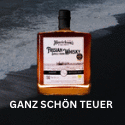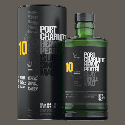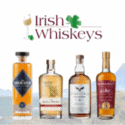Gerade erschienen und über den Webshop bei Bruichladdich bestellbar: Der Octomore 13.4 ist die letzte Ausgabe in der 13. Auflage der Octomores. Aus Concerto Barley vom schottischen Festland destilliert, reifte er in Virgin American Oak casks. In ihm finden sich Noten von gerösteter Eiche, süßer Vanille, Toffee und Gewürzen, ausgewogen mit Octomores charakteristischem Rauch.
Abgefüllt ist er mit satten 61,4% vol. Alkoholstärke, der Torfgrad des Getreides beträgt 137,3ppm, sein Preis im Shop (er ist nur in der Destillerie und dort zu bekommen!) beträgt 170 Pfund, da kommen aber noch Versand und Abgaben dazu.
Die genauen technischen Infos zu dieser Abfüllung nachstehend:
- BARLEY PROVENANCE: 100% Scottish grown Concerto barley
- MALTING: Super Heavily Peated
- DISTILLATION: Distilled in 2016 from the 2015 harvest
- AGE: 5 Aged Years
- MATURATION PROFILE: First fill ex-American whiskey and 300 litre American virgin oak cask maturation
- PHENOL LEVEL: 137.3 parts per million (PPM)
- STRENGTH: 61.6% ABV

Bruichladdich beschreibt den Octomore 13.4 so:
This limited edition Octomore 13.4 began its maturing life in first fill ex-American whiskey casks for six months before being transferred into 300 litre American virgin oak casks, which had been subjected to a high toast level.
This high toast level in the cask brings warming and complex toasted oak notes, with layer upon layer of vanilla, toffee and spice.
Und hier noch ein Zitat von Master Distiller Adam Hannett:
“These casks are like sister casks to those used in the release of the Octomore 10.4. Both distilled in 2016 from the Scottish Mainland harvest of Concerto barley, the defining difference has been in the type of oak species used, with this particular expression using American virgin oak (Quercus Alba), while the 10.4 used European virgin oak (Quercus Robur). The difference in flavour demonstrates the evolving suite of compounds found through oak species, the different coopering make-up (cask size) and the time spent in the respective casks.”
Adam Hannett, Master Distiller















